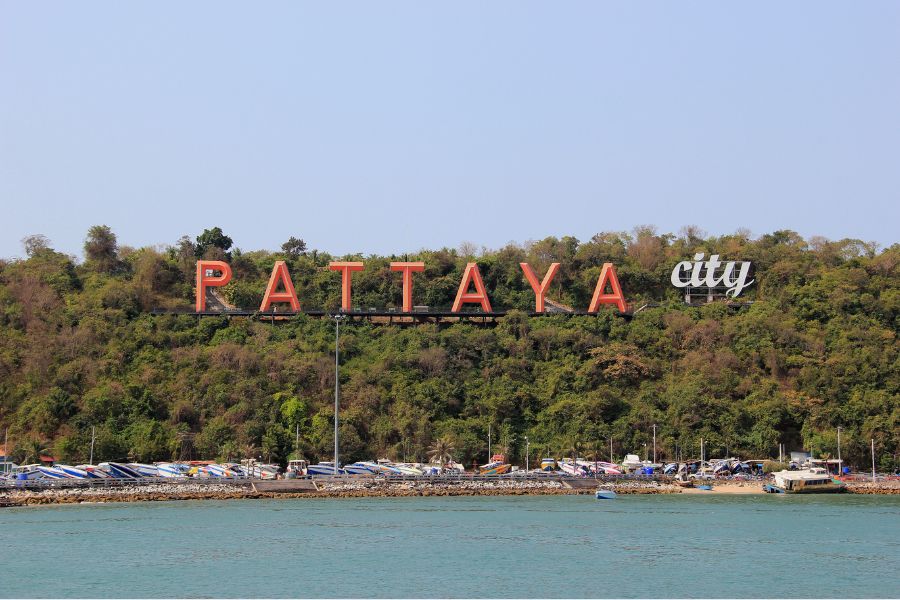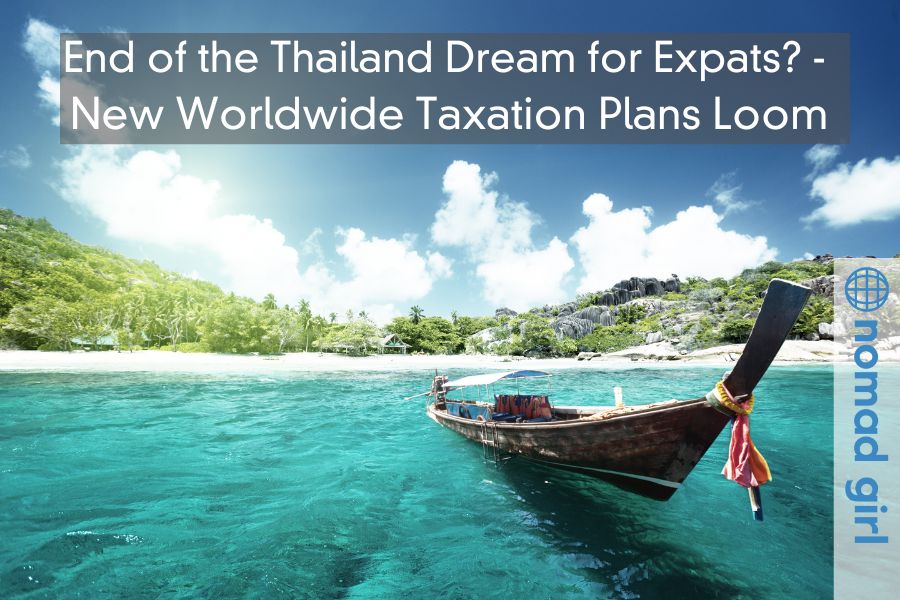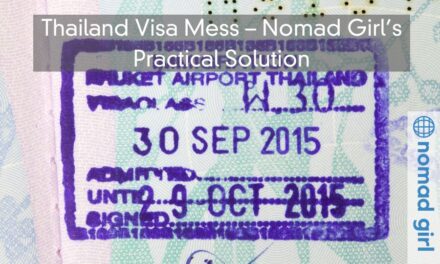For the past four decades, Thailand has been the go-to paradise for expats, digital nomads, and retirees. The country has long offered a seductive combination of warm weather, mouth-watering cuisine, a laid-back island lifestyle, affordable living, and those coveted Thai massages on tap.
Cities like Bangkok and Chiang Mai pulse with vibrant energy, offering a blend of tradition and modernity that many Westerners find irresistible. But perhaps the most tantalizing draw of all has been the opportunity to live largely tax-free, a loophole many expats and nomads have deftly navigated to build their perfect lives in the Land of Smiles.
Of course, nothing is perfect. The dream of living in Thailand comes with its fair share of bureaucratic headaches. Visa runs, 90-day reporting at immigration, and the constant juggling of documents have tested the patience of even the most seasoned expats. But the inconvenience of paperwork has always been offset by the rewards: a life of affordable luxury and tropical bliss.
Even the air pollution choking the northern regions during the burning season, which drags on from mid-February for months, hasn’t been enough to deter those in search of the “Thailand dream.” Despite these drawbacks, many—myself included—have made Thailand home for at least half the year, retreating to idyllic spots like Koh Samui, where palm trees sway and the sea sparkles in the sun.

Yet, as 2024 unfolds, winds of change are rattling the palm trees. The lure of Thailand may soon come with a hefty price tag, as the Thai government eyes new taxation rules that could hit expats, digital nomads, and retirees where it hurts: in their wallets.
World Wide Taxation: A New Reality?
In 2024, Thailand made a move to tax all money remitted to the country by anyone living there for over 180 days in a tax year. This shift sent shockwaves through the expat community, many of whom had long structured their financial affairs to avoid such taxation. But if that wasn’t enough, the government now seems poised to take it one step further: worldwide taxation.
The proposal currently on the table would apply to all foreign residents in Thailand who stay for more than 180 days per year. This includes not only expats and digital nomads but also the large retiree population that has settled in Thailand. Should this plan go into effect, it would mean a taxation rate of 25-30% on one’s total global income. Imagine earning your income overseas, only to have a third of it siphoned away by a government that offers little in return in terms of free education or quality healthcare.
Thailand’s Aging Crisis: The Hidden Catalyst
Why would Thailand, a country known for its expat-friendly policies, suddenly consider imposing such a severe tax regime? The answer lies in demographics. Thailand, much like its Asian neighbours South Korea and Taiwan, is facing an ageing crisis. Nearly 20% of the population is over 60, and the country’s birth rate is alarmingly low. The old adage that Thailand is “growing old before it grows rich” rings truer by the day. Unlike wealthier nations in the region, Thailand lacks the resources to comfortably care for its ageing population, and the strain is showing.
In a desperate bid to stimulate the economy, Thailand’s new government has resorted to unconventional measures, such as handing every Thai citizen a digital wallet loaded with 10,000 THB. While this is meant to jumpstart consumer spending, it also highlights just how strapped for cash the country truly is. It’s in this economic context that the proposed taxation changes have emerged.
OECD Pressure: A Push Towards Harmonization
Some suggest that Thailand’s proposed tax changes are not solely driven by domestic concerns. The OECD (Organisation for Economic Co-operation and Development) has long pressured countries with territorial-based taxation systems—like Thailand—to adopt more harmonized tax regimes. In this globalized world, tax evasion has become a major point of contention for international organizations, and Thailand appears to be feeling the heat.
Expats with Foreign-Sourced Income: The End of a Tax-Free Life?
The appeal of Thailand for many expats has always been the opportunity to live a tax-free life, provided you structured your affairs wisely. This was the trade-off for a few hassles: securing private health insurance, paying for private education if you had children, and navigating the Thai visa system’s bureaucratic maze. With the right amount of patience and money, you could even obtain a Thailand Privilege Card, which came with certain benefits.
But with the spectre of worldwide taxation looming, this delicate balance threatens to tip in the wrong direction. A 30% tax on one’s worldwide income starts to feel like an unreasonable burden, especially when Thailand does not offer the perks that Western countries do in return, such as free schooling and high-quality healthcare. For many expats, the question will not be whether they can continue living comfortably in Thailand, but whether it’s worth staying at all.
Countries that have long been seen as alternatives—Malaysia, the Philippines, and even one’s home country with free healthcare and education —may suddenly start looking more attractive.

Pensioners: Once the Ideal Spot, Now on Shaky Ground?
Thailand has long been a haven for pensioners, who flock to its shores for the low cost of living, warm weather, and affordable street food. The allure of Thai women and a laid-back lifestyle have drawn many Western retirees to Thailand’s tropical shores. A few bureaucratic hurdles—such as annual visa renewals and the cost of private health insurance—were a small price to pay for a tax-free pension and a comfortable life.
However, with the introduction of worldwide taxation, pensioners may find themselves rethinking their retirement plans. Some pensions are taxed in the country of origin (some when paying contributions and some when taking out the pension), but under Thailand’s new proposal, these pensions would be subject to Thai taxes as well, unless protected by double taxation agreements. Thailand currently has agreements in place with 61 countries, but navigating the complexities of these treaties can be daunting.
Countries like the Philippines, which offers a more favourable tax environment, or even European nations such as Italy and Greece, are now emerging as potential alternatives. Both Italy and Greece offer pensioners flat tax rates of 7% without the need for costly private health insurance or complex visa renewals. For European retirees, these closer-to-home options may start to feel more appealing than Thailand’s shifting tax landscape.

What will happen to Pattaya if a huge number of its foreign pensioners leave?
Digital nomads, who have become an integral part of Thailand’s economy, are no strangers to change. The introduction of the DTV (Destination Thailand Visa) was a godsend for many nomads, offering an easy-to-obtain, low-cost visa valid for five years. With the option to stay for up to 180 days before requiring a visa run or extension, many digital nomads settled into a comfortable routine.
However, the new 180-day taxation rule could see this group of free-spirited workers fleeing Thailand in favour of more tax-friendly destinations. Neighbouring countries like Malaysia, Indonesia, the Philippines, and Vietnam are likely to benefit from Thailand’s loss. Malaysia, in particular, offers the De Rantau Pass, a tax-free visa option for digital nomads, along with an entire ecosystem designed to support them. With better incentives and fewer financial burdens, these countries could become the new hubs for the world’s digital workforce.
Greece and Italy: A New “Dolce Vita” for Expats?
Interestingly, while Thailand grapples with the implications of an ageing population and tax reform, countries like Italy and Greece are actively courting expats and pensioners. Both nations face their own aging crises, but their approach to wealthy foreign residents is starkly different from Thailand’s. Having suffered a brain drain following the 2008 financial crisis, Italy and Greece are now offering a slew of incentives to attract foreign residents or returning residents.

In Italy, pensioners can enjoy a 7% flat tax rate for 10 years, which includes access to the local healthcare system—something far superior to what Thailand has to offer. Greece offers a similar deal for 15 years.
Both countries have non-domicile programs targeting the ultra-wealthy. Flat annual taxes of 100,000 euros in Greece and 200,000 euros in Italy grant 15 years of access to these programs. Furthermore, both countries offer a path to permanent residency after five years of temporary residency and citizenship after ten years.
Property prices in these countries can also be surprisingly affordable, with Italy’s famous “one-euro homes” making headlines worldwide. The cost of living in rural Italy or Greece can be quite low, making these destinations even more appealing for those looking to relocate from Thailand.
Solutions for Retaining Thailand’s Expat Community
Thailand’s leaders should take a lesson from countries like Italy and Greece, which are actively courting foreign residents rather than pushing them away. Offering incentives, rather than penalties, would be a far more effective strategy to retain this valuable segment of the population. A few ideas could include:
- Introducing a Non-Dom Taxation Rule: Following models in the EU, Thailand could implement a flat-tax system for foreign residents. This might be limited to a certain number of years—say 15—allowing expats to contribute without bearing the full brunt of worldwide taxation.
- Offering Residency and Citizenship Pathways: Many expats have made long-term commitments to Thailand, yet are left in limbo regarding permanent residency or citizenship. Offering clear and attainable pathways to residency and citizenship would provide a sense of security and long-term stability, making Thailand an even more attractive option for expats.
- Reforming Property Ownership Laws: Allowing foreigners to own property outright, rather than through convoluted legal structures, would not only incentivize investment but also show a willingness to integrate foreign residents into the country’s long-term plans.
- Exemptions or Reduced Taxes for Pensioners: Implementing tax exemptions or reduced rates for retirees—similar to the flat 7% tax rates offered in Greece and Italy—would help retain Thailand’s significant retiree population, which contributes substantially to the local economy, especially in areas like healthcare, real estate, and tourism.
A Balancing Act for Thailand
Thailand stands at a crossroads. If the government goes forward with the new taxation plans without offering any concessions or benefits to the expat and foreign retirement community, they risk pushing away a group that has long been integral to the country’s economy. Western levels of taxation with substandard services and no clear path to permanent residency or property ownership will not be an appealing deal for many, and Thailand could see a swift exodus of its foreign residents.
Yet, there is still time for Thailand to course-correct. By adopting a more inclusive, forward-thinking approach to taxation and residency, the country could retain its appeal while still addressing its economic challenges. The expats, digital nomads, and retirees living in Thailand might not have the power to vote, but they certainly have the power to leave—and in doing so, they’ll take their wealth, skills, and spending power with them.
Troubling Numbers from the Expat Community
Will Thailand Remain a Dream?
Thailand’s idyllic dream for expats has long rested on a fine balance—affordable living, beautiful landscapes, and minimal taxes. However, the new worldwide taxation plans threaten to disrupt that balance, making Thailand an expensive and potentially less appealing destination. With no clear plan in place to ease the burden on expats, digital nomads, and retirees, the country risks losing the very people who have helped make it a global hotspot.
Other countries have learned to offer more for less, and Thailand could soon find itself competing for the same pool of mobile, financially savvy individuals who can easily relocate. If Thailand’s leaders fail to recognize the value of their expat community and the economic clout they carry, the dream may very well come to an end.
For now, many are left wondering: will the Land of Smiles become the land of taxes, or will Thailand take steps to keep the dream alive?


















